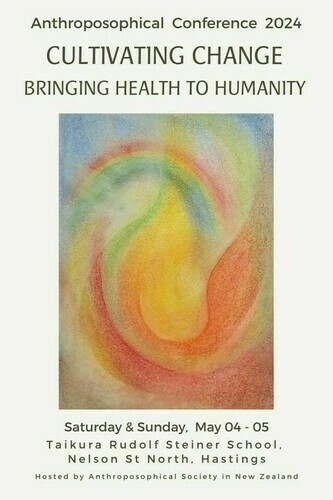News 10-24Anthroposophy in Hawkes Bay Sunday 10 March Week 10-24 Coming Events Calendar of Coming Events In the Rudolf Steiner Centre, 401 Whitehead Road, Hastings
Study Groups
Community Notices. Send contributions to the Editor, info@anthrohb.nz before 2 pm on the Saturday prior. Robin Bacchus Annual General Meeting: Saturday 13 April at 2 pm. That is 6 weeks away. Now is the time to be asking yourself if you are prepared to volunteer to join the Centre Committe that cares for the Rudolf Steiner Centre, or more importantly, to be an Event organiser. John Jackson organises seasonal Festivals, but at present we have no Event Organisers - a small group of people who are prepared to plan, organise and arrange a varied schedule of events from concerts to talks to displays in the Centre. The life of the society thrives when members have opportunities to meet fellow members and friends. If you have any questions, please contact info@anthrohb.nz
E ngaki ana a mua e tōtō ana a muri. First cultivating, then planting.
If those ahead do their work, those following can do theirs
and all can achieve their common goal.
The guest lecturer, Ueli Hurter, is Executive Council member and Agriculture Section co-leader at the Goetheanum, Switzerland.
All welcome
Attending such a conference is a great way to meet and talk with people, share ideas and initiatives, gain new insights and inspirations and be part of a wider community. Please go to: REGISTRATION - Anthroposophical Society in New Zealand (anthroposophy.org.nz) for more details about this conference. Thank you to those who have offered to help. Although there will, no doubt, be various needs at a later date, the effective way to assist at this stage is to REGISTER as soon as possible as this helps the organisers. With Best wishes, Diana, on behalf of the local group (Bernie, Gerrit, Pippa, Rosie, Rachel) Activities The Editor would like to invite all those who are running, or wishing to create, a Study Group, or who are offering Training Courses or Seminars on Anthroposophical themes to announce in the Newsletter details of what they are doing when, and how those interested in participating can make contact. If you are wishing to find others who may like to join you in forming a group for some purpose, please send details to: info@anthrohb.nz THREEFOLDING Cultivating Three types of Conversation: Human Encounter in a Threefold Society Notes from Chapter 16 written by Steve Briault in “Free, Equal and Mutual” 978-1-907359-94-1 ANTIPATHY “DIALOGUE can be considered as a free flow of meaning between people in communication …. a free exchange of ideas and information is of fundamental relevance for transforming culture and freeing it of destructive misinformation, so that creativity can be liberated.” But beware of ‘debate’ [which literally means ‘to batter down’] Learning, in the cultural sector, requires us to overcome our antipathy for other people’s ideas, to listen and expand our experience/knowledge. Recognise the freedom of the other to have their own ideas: In the process we may discover new ways of perceiving the world that had previously eluded us. EMPATHY Consensus-building. The Universal Declaration of Human Rights was only adopted by the United Nations General Assembly in 1948 – so it is a relatively recent concept. However today it is effectively ignored in many places. In 1917, before the end of WW1, Rudolf Steiner, in his lecture series “The spiritual background of the external world: the fall of the spirits of darkness” [CW177] says: “Here is another point where we have to be watchful. In particular, it is not possible to understand the present time unless one knows the change of function which came in the last third of the nineteenth century. A fourteenth-century person who spoke of the ideals of race and nation would have been speaking in terms of the progressive tendencies of human evolution; someone who speaks of the ideal of race and nation and of tribal membership today is speaking of impulses which are part of the decline of humanity. If anyone now considers them to be progressive ideals to present to humanity, this is an untruth. Nothing is more designed to take humanity into its decline than the propagation of ideals of race, nation and blood. Nothing is more likely to prevent human progress than proclamations of national ideals belonging to earlier centuries which continue to be preserved by the Luciferic and Ahrimanic powers. The true ideal must arise from what we find in the world of the spirit, not in the blood.” This was the kind of statement that caused Adolf Hitler to declare Rudolf Steiner ‘my greatest enemy’. This was an early call for universal humanity, universal rights, not just for a privileged group. A healthy rights life requires an ongoing, inclusive conversation in society focused on the central questions of what is fair, reasonable and equitable in every aspect of life, based on common agreements and regulated by representative authorities. The feeling for justice lives in individuals, and thus originates in cultural life; the more such conversations can create (not impose) consensus out of the diversity of individual views, the more harmonious that society will be. The central quality required is therefore the cultivation of empathy. Empathy [a word first coined in the early 20th Century] is the ability to imagine another person’s experience, without necessarily sharing or endorsing it. Guarantee the freedom of the other: SYMPATHY For the Economic sector to thrive there needs to be collaboration. The design of products, the planning and operation of production systems can be guided by consultation and agreement between all the relevant stakeholder groups, taking account of the legitimate needs and interests of customer and suppliers. Such negotiations could replace abstract ‘Market forces’ driven by persuasive, manipulative advertising with conscious human choices based on mutual understanding. In this way ‘new Sympathies’ can be developed. Summary:
Posted: Sat 17 Feb 2024 |
| © Copyright 2026 Anthroposophy in Hawkes Bay | Site map | Website World - Website Builder NZ |


